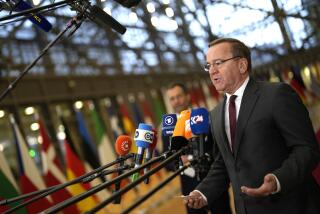NEWS ANALYSIS : Germany Tells Gorbachev Its Help Has Limits, Asks for Others to Share Burden : Europe: Bonn has plenty of bills of its own with reunification. The message is that others must chip in.
BONN — In addition to a comprehensive 20-year treaty with its promise of German help for reviving his country’s shattered economy, Soviet President Mikhail S. Gorbachev got a less-welcome message during his just-completed two-day visit here: Germany’s ability to help is limited.
In the wake of the visit, a subtle yet definite shift of emphasis in German policy toward the Soviet Union has become clear.
Increasingly aware of the enormity of Moscow’s needs, Chancellor Helmut Kohl’s center-right coalition has launched a concerted effort to spread the burden beyond Germany.
On Sunday, President Richard von Weizsaecker became the latest German leader to pick up the theme, urging Japanese Prime Minister Toshiki Kaifu not to ignore Soviet needs for economic development.
In Tokyo for the enthronement of Emperor Akihito, Von Weizsaecker told Kaifu that the Soviet Union must be firmly incorporated into the global economy. Japan, as well as Germany, is in a unique position to help Moscow rebuild its crumbling infrastructure, he said.
Japan has been reluctant to aid Moscow, in part because of a long-simmering dispute over possession of the island of Sakhalin and the Kuril chain, north of Japan.
The German president’s remarks follow similar statements made by Kohl and German Foreign Minister Hans-Dietrich Genscher during the Gorbachev visit, which ended over the weekend.
Instead of promising the beleaguered Soviet leader more assistance during the trip, Kohl pledged only that he will “personally see to it” that initiatives for helping Moscow, presented to summits of the European Community and top industrialized nations last summer, will be pursued.
Proposals presented to both summits by Kohl and French President Francois Mitterrand for $15 billion in credits were taken under consideration by member states, but no decisions have been made.
Genscher, in a television interview Saturday, said Germany is pushing for a major Western initiative before the end of the year for joint assistance to the Soviet Union.
“I hope that the other Western countries recognize the enormous importance that the success of Gorbachev’s reforms mean to the West,” Genscher said. “It’s not only for the situation in Europe, and that’s why we are urging our Western partners so urgently.”
Germany so far this year has provided Moscow with $13 billion in grants, payments and unconditional credits. Public as well as government resistance to more aid is now visible here.
“It could be that Gorbachev is expecting too much from this ‘great nation,’ as he now calls the Germans,” commented the national German Sunday newspaper, Welt am Sonntag. Much of the German money provided so far was little more than a payoff for the needed Soviet blessing of unification and the withdrawal of its military forces from German territory.
But Germany also stands to lose more than virtually any other European country if the Soviet Union slips into chaos.
Germany is already Moscow’s single biggest trading partner, it is geographically near and it is also worried that Soviet instability could heighten pressures to emigrate among the estimated 2-million-strong Germany minority in the Soviet Union.
The attempt to enlist others in the effort to aid Moscow came as German industrialists advised Kohl against extending more unconditional aid to the Soviet Union.
In letters to Kohl last week, the head of an East European trade committee, Otto Wolff von Amerogen, and the president of the German Industry Assn., Tyll Nekker, both said the success of financial help to Moscow depends on its being tied to projects that will improve Germany’s own export potential and the living conditions of the population.
Although Germany is one of the world’s richest nations, with a strong currency and stable economy, the revolutionary changes in Eastern Europe and its own reunification have left it with enormous financial burdens.
Estimates for rebuilding the former Communist eastern region of the country now run as high as $100 billion a year over the next decade.
Other newly free former Communist East European states also look to Germany as their principal hope for financial and technical assistance as they try to revive their economies.
Last week, Kohl took a major step in reconciling Germany’s relationship with Poland, a move that is bound to require substantial economic help to Warsaw.
Bonn recently wrote off $500 million in Polish debt and is likely to pledge additional support when a major treaty establishing a framework for German-Polish relations is signed early next year.
Later this month, Czechoslovak Prime Minister Marian Calfa and Romanian Prime Minister Petre Roman are scheduled to travel to Bonn to discuss financial assistance.
More to Read
Sign up for Essential California
The most important California stories and recommendations in your inbox every morning.
You may occasionally receive promotional content from the Los Angeles Times.










